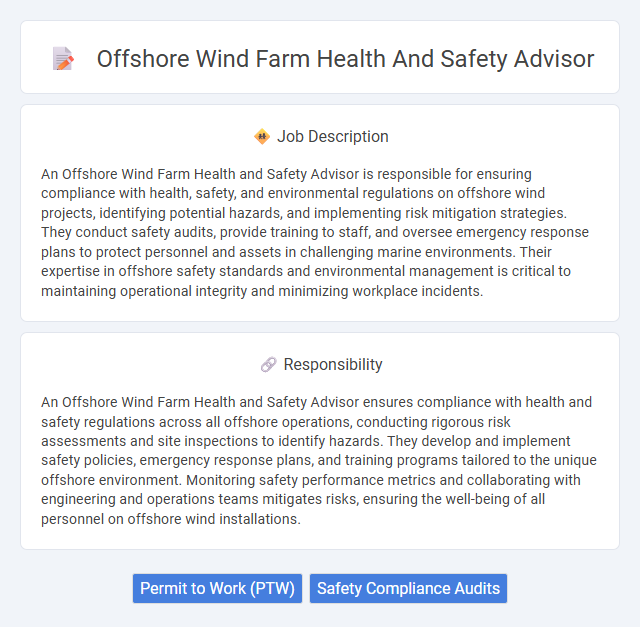
An Offshore Wind Farm Health and Safety Advisor is responsible for ensuring compliance with health, safety, and environmental regulations on offshore wind projects, identifying potential hazards, and implementing risk mitigation strategies. They conduct safety audits, provide training to staff, and oversee emergency response plans to protect personnel and assets in challenging marine environments. Their expertise in offshore safety standards and environmental management is critical to maintaining operational integrity and minimizing workplace incidents.
Candidates with strong physical fitness and the ability to work in challenging offshore environments are likely suitable for the role of Offshore Wind Farm Health and Safety Advisor. Individuals who exhibit high levels of situational awareness and stress management may better handle the demanding safety oversight responsibilities. Those unable to adapt to rigorous conditions or maintain focus in high-risk settings may face difficulties in fulfilling the job requirements effectively.
Qualification
An Offshore Wind Farm Health and Safety Advisor must possess extensive knowledge of health, safety, and environmental regulations specific to offshore wind operations, often demonstrated by certifications such as NEBOSH International Diploma or IOSH Managing Safely. Proficiency in risk assessment, emergency response planning, and incident investigation is essential, supported by relevant offshore safety training including GWO Basic Safety Training. Strong communication skills and experience in liaising with regulatory bodies ensure compliance and promote a safety-first culture on offshore wind projects.
Responsibility
An Offshore Wind Farm Health and Safety Advisor ensures compliance with health and safety regulations across all offshore operations, conducting rigorous risk assessments and site inspections to identify hazards. They develop and implement safety policies, emergency response plans, and training programs tailored to the unique offshore environment. Monitoring safety performance metrics and collaborating with engineering and operations teams mitigates risks, ensuring the well-being of all personnel on offshore wind installations.
Benefit
Offshore wind farm health and safety advisors likely provide critical benefits by ensuring compliance with stringent safety regulations, reducing workplace accidents, and promoting a safety-first culture on challenging marine platforms. Their expertise probably minimizes downtime and operational disruptions, enhancing overall project efficiency and financial performance. Employing such professionals may also improve stakeholder confidence and support sustainable development goals within the renewable energy sector.
Challenge
The challenge in an offshore wind farm health and safety advisor role likely involves managing the unique risks associated with harsh marine environments and complex electrical systems. Ensuring compliance with stringent safety regulations while coordinating emergency response plans could require constant vigilance and adaptability. This position probably demands a proactive approach to hazard identification and mitigation to protect both personnel and equipment effectively.
Career Advancement
Offshore wind farm health and safety advisors play a crucial role in ensuring compliance with safety regulations and mitigating risks on renewable energy projects. Career advancement in this field often involves acquiring specialized certifications such as NEBOSH or IOSH and gaining experience in project management, leading to senior advisory or HSE managerial positions. Professionals can also transition into consultancy roles or safety training coordinators, leveraging their expertise to influence broader industry standards.
Key Terms
Permit to Work (PTW)
A Permit to Work (PTW) system is crucial for offshore wind farm health and safety advisors to control high-risk activities, ensuring all work complies with safety protocols and legal regulations. The PTW process involves rigorous risk assessments, authorization, and communication between teams to prevent accidents and manage hazards effectively on offshore installations. Mastery of PTW documentation and enforcement mitigates operational risks, safeguarding personnel and infrastructure in the challenging offshore environment.
Safety Compliance Audits
Safety Compliance Audits are crucial for Offshore Wind Farm Health and Safety Advisors to ensure adherence to regulatory standards and internal policies. These audits involve systematic inspections, risk assessments, and verification of safety protocols to prevent incidents and maintain operational integrity. Effective implementation of safety compliance measures reduces hazards, promotes worker protection, and supports sustainable offshore wind energy production.
 kuljobs.com
kuljobs.com